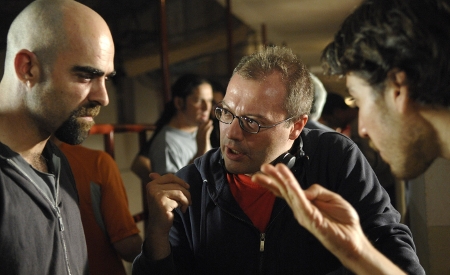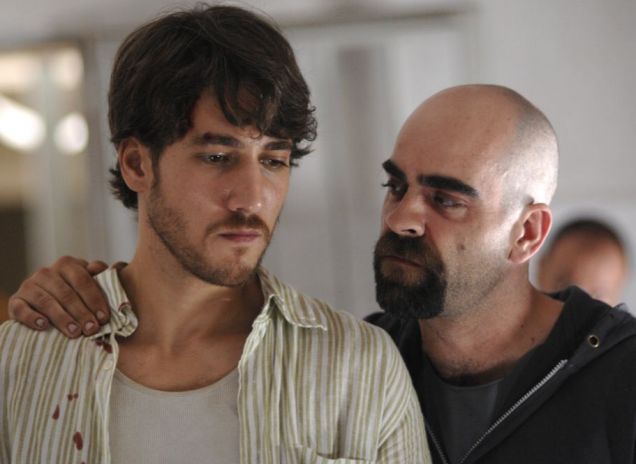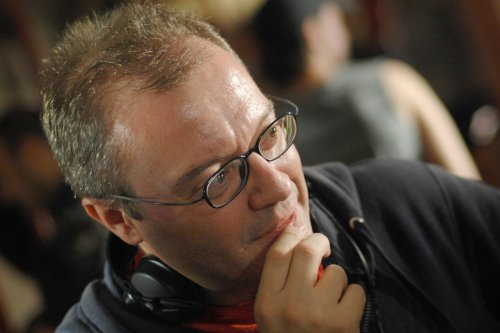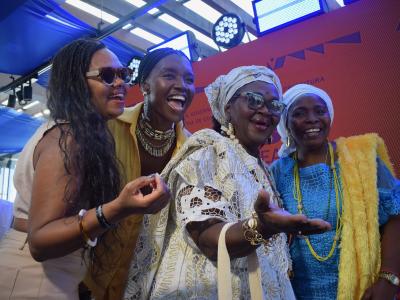It's not often that a thriller involving prisoners, could have you leaving the cinema with a feeling of having learnt something new about your own identity and morality. However, for Spanish director Daniel Monzón, prison presented the perfect backdrop to confront one of life's many questions - 'Do we really know who we are?'.
Eight times Goya Awards winner, including best adapted screenplay and best director, Cell 211 seems to have struck the perfect balance between action and philosophy - and the fame is well deserved. Daniel Monzón spent more than three years of his life dedicated to making this film. Originally adapted from a novel by Francisco Pérez Gandul, that goes by the same name, Cell 211 is more than just a well-scripted thriller.
In CELL 211, Juan Oliver, the main protagonist, goes one day earlier to his new job as a prison officer, in order to get familiarized with his new work surroundings. His choice takes a wrong turn when coincidentally a prison riot breaks out in the same day, trapping Juan with inmates. He is left with no other choice but to pretend to be one of the inmates, or to await the worst as a prison guard.
Starting from the very beginning, Daniel recalls the first thing that grabbed him about this particular novel. "I was quite skeptical when I opened this book, because my producer gave it to me [laughs], and you know... not everything producers give you is great material. However, in this case, I felt it from the very beginning. When I closed the book in the middle of the night, as I started to read it at 11, I finished it at 4 or 5 in the same morning - I had already seen the movie. I really wanted to do it, because it was a challenge for me as a filmmaker. With this story you don't have a lot of locations, you don't have special effects, you don't have a great soundtrack to convince the audience. What you do have is characters. A solid plot, in only one claustrophobic space to grab the audience by the neck. So for me it was a challenge and I love challenges."
Daniel felt this instant connection not only from its "forceful and convincing" beginning, but also from the fact that the plot very much resembled one from a greek tragedy, "where a character is in the middle of a very happy moment in his life, and suddenly he makes the wrong choice to go into work one day earlier, where his whole life is ruined." As is the case with the film's main character, Juan, played by actor Alberto Ammann, Daniel remembers how "these kind of stories used to shock me a lot when I was a student and read greek tragedies. So I instantly felt a connection with this story".
It is this very ingredient, like the instant connection one has for a particular story that makes them passionate for their work. Passionate enough to be able to carry it out for the next few years of their life, as Daniel suggests, "if you are going to work with a movie that lasts three years of your life, then you have to be very passionate about it. You have to be convinced that the material works. If you don't have this passion for the story, then you are not going to be able to convince the audience either".
However, except from an original plot, the director and screenplay writer Jorge Guerricaechevarrîa wanted the film to be different from all previous clichés about prison movies. "To make our movie different from the typical American prison movies, we decided to go to the actual prisons and do the research for ourselves. We visited many prisons, spoke to many inmates, guards, and the relatives of criminals".
Daniel explains that "every dialogue and character, comes from a real character, comes from reality". This is only one of the aspects which is so striking about Cell 211. Its quest to represent the reality behind the story. Even the main character of Malamadre (played by Luis Tosar) is based on a real prisoner, who created several riots during his time in prison. Upon meeting him, Luis Tosar tried to adopt the exact mannerisms and body language in order to prepare for his role.

During my interview with Daniel, I couldn't help but to ask what was it like to meet with these real prisoners. Did they feel intimidation, fear...? Daniel's response was an immediate "Yes. Very. At the beginning we felt fear. At the end - we felt fear [laughs]. We never really got used to it. But what we discovered, what we found was - human beings. Human beings talking with us. This was very, very important. To realize that they are not monsters, but that they are like you and me. To understand that they did something, in a moment".
So, "do you really know who you are?". This is one of the big questions the film leaves the audience with: a question which lingers in your mind long after the film has finished, confronting you with your own morality and what you might be capable of in a given moment. As the director puts it, "a character who is sweet, naive, handsome and pure. But put him in a situation so extreme and desperate like this, then he would react like any other person would. Because, it depends on the circumstances that you have to live with. This is what we felt when we were talking with these guys. And although we found some who were nuts - there were also good people who made a bad decision in a moment in their life, where they had to confront a situation so brutal, that they reacted in a bad way, which they now have to live with."
Although as an audience, we too feel as if we are inside those prison walls, living through this experience together with the character. In order to achieve this effect, the director only lets us see what Juan can see. We, like Juan, don't know anything more about the inmates or situation than he does. Throughout his journey, we also feel like we have to make a choice of 'what to do next'. "So the audience is understanding him and justifying his actions, because they have gone through journey of Juan themselves. And this is what is interesting about the film. The journey of Juan, is also your journey, so you also think 'I don't know who I am'."
Furthermore, the director doesn't introduce the character of Juan from the start of the film. The audience do not know him any more than the inmates do, except from the fact that we know he is not really an inmate. Putting Juan in a neutral position as everybody else in the film is important, so that we are not judging any of the characters from their past, but from their current actions. The only way we get to know what Juan is like, is through his responses of his experiences within the prison, the same way we do with the inmate Malamadre.
"But what is most interesting in the film, is this relationship between the two main characters, Malamadre and Juan, who are so different from the beginning. But as the circumstances evolve, they characters get closer, and it is not long before you realize how similar they actually are." The film turns all previous stereotypes about prisoners, upside down. By the end of the film you realize that "the assassin has a moral code - stronger, than the people who are supposed to protect the law".

This is yet another aspect of the film, separating it from all the other prison films. Instead of shading everything as 'black' or 'white', 'good' and 'bad' - "rather we tried to create the 'shade of grey'." It shows you, that no-one really is only good, or only bad, but we are all capable of making the same mistakes. "The movie is disturbing because of this. Because, by putting the character in this extreme situation and confronting him, it is also confronting you."
"But we tried to give a good reason for the actions of every character, even Utrilla. Utrilla who is a violent guy, a bad guy, but he has his reasons for it. He says that to combat violence, you have to use violence. And although he is not a well liked character, he is needed in order to get the truth out, and does what he does, because he knows there is no other way to do it.
This is what we tried to do. We don't want everything to be in black and white, the good and the bad guy".
"My intention was to share my vision with the audience. To put them in a key hole of a cell, and let them see what really happens behind these walls. Even more, I tried to put the audience in the middle of the violence and suffer with Juan, have the same destiny that he has. So in a way it is a philosophical film, as it makes you question your own reality. It presents you with a moral question."















